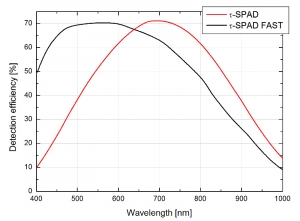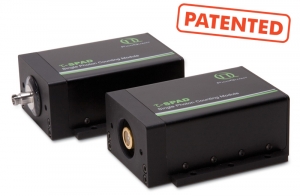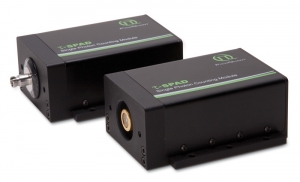Photon Counting Detectors
tau-SPAD (discontinued)
Single Photon Counting Module
- Timing resolution down to <350 ps (FWHM)
- Detection efficiency up to 70%
- Very low dark counts
- Active area 150 µm
- NIM and TTL signal output
- Optional fiber connector
- Optional FAST model with timing down to 150 ps (FWHM)
This product is discontinued as of December 2014.
Please check our other single photon sensitive detectors for possible alternatives.
The τ-SPAD photon counting modules combines Laser Components' ultra-low noise VLoK silicon avalanche photodiode with specially developed quenching electronics from PicoQuant (covered by patent DE 10 2010 060 527). The low dark counts and high photon detection efficiency make it an ideal detector for single molecule applications, like Fluorescence Correlation Spectroscopy (FCS) or Fluorescence Lifetime Imaging (FLIM).
Detection efficiency up to 70%
 The τ-SPAD features an extremely high photon detection efficiency of typically 70 % at 670 nm and can be used to detect single photons over the 400 nm to 1100 nm wavelength range. It can be supplied with an easy to use FC/PC connection for optical fibers or as a free-beam module.
The τ-SPAD features an extremely high photon detection efficiency of typically 70 % at 670 nm and can be used to detect single photons over the 400 nm to 1100 nm wavelength range. It can be supplied with an easy to use FC/PC connection for optical fibers or as a free-beam module.
Timing resolution down to 350 ps
The τ-SPAD generates a NIM and a TTL output pulse per detected photon and can therefore be directly interfaced with different data acquisition systems such as TCSPC electronics. The photon timing response can be as short as 350 ps (FWHM, depending on module, wavelength and signal rate).
τ-SPAD FAST for timing down to 150 ps
An alternative version of the τ-SPAD (τ-SPAD FAST) features a timing resolution between 150 ps and 400 ps (FWHM, depending on conditons and module). These modules are based on a different APD that has a dark counte rate <500 cps and a detection efficiency up to 70% at 470 nm. Please contact us for further details.
This product is discontinued as of December 2014.
| τ-SPAD | τ-SPAD FAST | ||
|---|---|---|---|
| Spectral range | 400 nm - 1100 nm | 400 nm - 1100 nm | |
| Active area diameter | 150 µm | 500 µm | |
| Photon timing resolution* | 350 ps - 800 ps (FWHM, depending on module, wavelength and signal rate) | 150 ps - 400 ps (FWHM, depending on module, wavelength and signal rate) | |
| Afterpulsing probability (0 to 500 ns)* | < 1 % (typical) | < 5 % (typical) | |
| Dead time | < 70 ns (typical) | < 70 ns (typical) | |
| Fiber connector type (optional) | FC/PC | FC/PC | |
| Dark count rate | |||
| τ-SPAD-20 | < 20 cps (available upon request) | <500 cps (typical) | |
| τ-SPAD-50 | < 50 cps (available upon request) | ||
| τ-SPAD-100 | < 100 cps (available upon request) | ||
| τ-SPAD-250 | < 250 cps (available upon request) | ||
| Photon detection efficiency* (typical values, without fiber connector) | |||
| @ 405 nm | 10 ± 5 % | 50 ± 5 % | |
| @ 470 nm | 30 ± 5 % | 70 ± 5 % | |
| @ 670 nm | 70 ± 5 % | 65 ± 5 % | |
| @ 890 nm | 35 ± 5 % | 20 ± 5 % | |
| Losses due to fiber connector: approx. 10% absolute | |||
| Input / Output | |||
| NIM output | |||
| Pulse width | 15 ns - 25 ns | ||
| Pulse amplitude | -0.8 V to -1 V (into 50 Ohms) | ||
| Connector type | SMA | ||
| TTL output | |||
| Pulse width | 15 ns - 25 ns | ||
| Pulse amplitude | > 2.4 V (into 50 Ohms) | ||
| Connector type | Lemo, type EPS.00.250 | ||
| Gating input | |||
| Input voltage | TTL control, TTL high (>2.4 V) enables counting | ||
| Response time | disable: < 40 ns (typ. 20 ns); enable: < 100 ns (typ. 85 ns) | ||
| Connector type | SMA | ||
| Operating conditions | |||
| Supply voltage | 12 V | ||
| Supply current | 1.5 A (at turn on), 0.3 A (at 1 Mcps) | ||
| Operating temperature | 10 °C - 40 °C | ||
* measured by illuminating < 30 µm in the center of the active area
Typical detection efficiency vs. wavelength (without fiber connector)
All Information given here is reliable to our best knowledge. However, no responsibility is assumed for possible inaccuracies or omissions. Specifications and external appearances are subject to change without notice.
This product is discontinued as of December 2014.
The single photon sensitive τ-SPAD detectors can be used in various applications, where the very high sensitivity and good timing resolution of the detector are important, such as:
- Time-Resolved Fluorescence
- Fluorescence Lifetime Imaging (FLIM)
- Phosphorescence Lifetime Imaging (PLIM)
- Fluorescence Correlation Spectroscopy (FCS)
- Fluorescence Lifetime Correlation Spectroscopy (FLCS)
- Foerster Resonance Energy Transfer (FRET)
- Stimulated Emission Depletion Microscopy (STED)
- Dual Focus Fluorescence Correlation Spectroscopy (2fFCS)
- Pulsed Interleaved Excitation (PIE)
- Time-Resolved Photoluminescence (TRPL)
- TRPL Imaging
- Fluorescence Upconversion
- Bunch Purity
- LIDAR/Ranging/SLR
- Antibunching
- Coincidence Correlation
- Quantum Communciation
- Quantum Entanglement
- Quantum Teleportation
- Quantum Information Processing
This product is discontinued as of December 2014.
The following documents are available for download:
Latest 10 publications referencing SPADs
The following list is an extract of 10 recent publications from our bibliography that either bear reference or are releated to this product in some way. Do you miss your publication? If yes, we will be happy to include it in our bibliography. Please send an e-mail to info@picoquant.com containing the appropriate citation. Thank you very much in advance for your kind co-operation.




